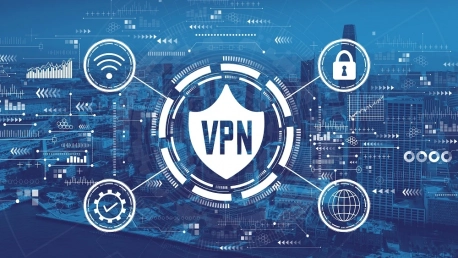The prevalence of free Android VPNs raises substantial privacy and security concerns. Top10VPN’s damning report on the top 100 most downloaded free VPN apps, with over 2.5 billion installs, reveals alarming vulnerabilities that could undermine the very purpose of using a VPN. Are these freely available services truly safeguarding your online activity, or are they exposing you to greater risks?
Unencrypted Data: A Privacy Hazard
Top10VPN’s investigation has unearthed a disturbing fact: over 10% of free VPN apps lack the necessary encryption to protect user data effectively. This revelation is concerning given that encryption is the crux of a VPN’s defense, warding off unwanted surveillance and cyberattacks. Without it, users are prone to having their sensitive information intercepted, which contradicts the core essence of what VPNs stand for. This suggests that the shield provided by some free VPN apps is, in reality, filled with holes, leaving user data vulnerable to exploitation by opportunistic cybercriminals and intrusive surveillance.Encryption isn’t just about privacy; it’s the backbone of digital security. Yet, according to the report, many free VPNs are skimping on this critical feature. As a result, the users of these apps can inadvertently become low-hanging fruit for hackers and data thieves. Considering these VPNs are downloaded by millions, the scale of the potential risks is vast, raising serious questions about the fundamental integrity of these applications.
The Instability of Free VPNs
Making matters worse, the research found that more than half of the free VPNs suffer from instability in their VPN tunnels. This instability can result in an inconsistent veil of privacy for users, leading to frequent brief moments where their data and online activities are exposed. When consumers download a VPN, they expect a reliable and stable connection that masks their actions at all times. But the reality presented by Top10VPN’s findings suggests a different story, one where the very tool used to provide privacy could sporadically fail, leaving users vulnerable without their knowledge.The consequences of these unreliable connections go beyond a mere privacy faux pas; they could mean the inadvertent leakage of personal data to anyone who might be watching. The presumed anonymity of users is shattered when their VPN connections drop, even momentarily, making their online activities visible to ISPs, advertisers, or malicious entities.
The Risk of IP and DNS Leaks
Further exacerbating the privacy concerns, the report also draws attention to the rampant IP and WebRTC leaks prevalent across numerous free VPN services. Notably, many users have unknowingly had their locations and identities compromised by using apps such as Tomato VPN and Ultimate VPN, which were found to have significant IP leaks. Even those apps that appeared to be leak-free were not entirely secure, as some, including the likes of Turbo VPN, were identified as having DNS leaks, endangering the confidentiality of their users’ online queries.DNS leaks are particularly concerning because they can reveal the websites a person visits to their ISP or any eavesdropper tuned in. Despite the protection a VPN is supposed to offer, when DNS queries are leaked, the illusion of online anonymity is quickly dispelled, potentially enabling cyber threats and unwarranted surveillance to target a user based on their internet history.
The Shadow of Foreign Surveillance
The inquiry also brought to light that fifteen apps under review contained code linked to ByteDance, the Chinese company behind TikTok. Given the scrutiny from U.S. regulators, who consider ByteDance a national security concern, the presence of such code ignites fears about user privacy and potential foreign surveillance. This connection must be interpreted within the larger fears regarding data sovereignty and the possible espionage efforts of foreign powers, adding another dimension of anxiety for users relying on these VPN services for privacy.Within the context of data sovereignty, the involvement of a company flagged by regulators suggests a realization of those espionage fears. Users expecting anonymity could instead be subject to data collection practices that might serve as a conduit for surveillance by foreign entities. This possibility becomes all the more alarming when taken in conjunction with the other security flaws uncovered by the report.
Malware Infestation in Free VPNs
Adding insult to injury, the Top10VPN report points out that an unsettling 20% of the examined free VPN apps triggered malware alerts. Antivirus tools have marked these as possible carriers of Trojans or phishing software—tools often used in cybercrimes. While some detections may be false positives, the association between free VPN apps and potential cybersecurity threats is troublesome. These apps have also been connected to IP addresses previously signaled for malicious activities, which only deepens the security concerns surrounding them.The malware findings paint a grim picture, suggesting that users seeking privacy and security might instead be opening a backdoor to cybercriminals. With free VPN apps potentially acting as Trojan horses, the trade-off for cost-free access to a VPN might result in paying a high price in terms of compromised personal and data security.
Secure Free VPNs: An Exception Rather Than a Rule
Despite the gloomy outlook, certain free VPNs like Atlas VPN and Bitdefender VPN stood out in Top10VPN’s report as safeguarding against leaks and maintaining user privacy. They proved to be exceptions in an otherwise risky landscape, demonstrating that some services are committed to providing adequate security measures. They serve as a stark reminder that not all free VPNs are bad actors, but also as a warning that these trustworthy services are more the exception than the rule.When considering a free VPN service, diligent research becomes a non-negotiable practice. Scrutinizing a VPN’s security features, understanding its privacy policy, and checking for reports of leaks or flagged malware are necessary steps to ensure that the chosen VPN truly stands guard over one’s digital footprint without any hidden compromises.









